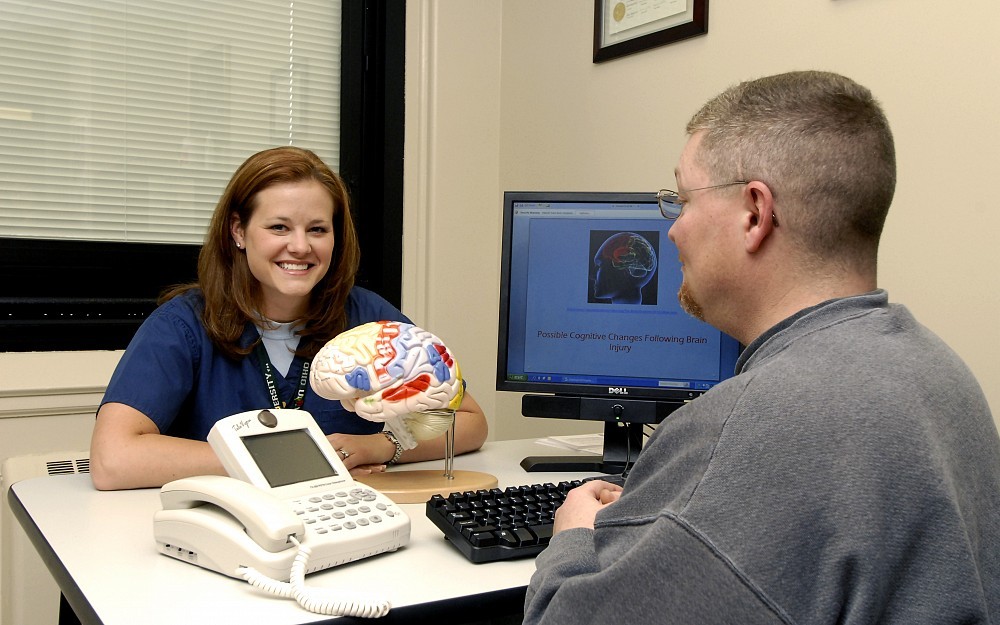
Allied Health Doctoral Student Develops Telehealth Therapy for Local Vets and Families
Through a newly funded telemedicine program, local veterans with traumatic brain injuries (TBI) will soon be able to receive cognitive therapy from trained professionals in their homes and along with their families.
The program is supported by a Veterans Affairs grant to Communications Sciences and Disorders PhD candidate Lindsay James Riegler.
Riegler, a speech language pathologist at the Cincinnati Department of Veterans Affairs (VA) Medical Center, received the $437,000 grant to expand an innovative telemedicine project she developed as part of her dissertation in the College of Allied Health Sciences.
In the original project, therapists sent veterans home with computers equipped with interactive therapy software and videoconferencing capabilities. Riegler says the software enabled veterans to receive cognitive therapy in their home or work environment at their convenience, improving their access to care.
Once able to continue therapy while maintaining a work schedule and other post-injury care, veterans made videoconferencing appointments with Riegler from Sunday afternoons to Friday evenings. But she still heard about their difficulties at home, where their post-injury symptoms, like memory loss, would continue to impact family life.
"The veteran isnt forgetting his wedding anniversary because he doesnt love his wife; its a consequence and a symptom of a brain injury, she says. "You not only need to treat the patient, but also treat the family, so they understand what their veteran is dealing with.
With the expanded program and new VA funding, Riegler and co-principal investigator Shari Wade, PhD, research professor of pediatrics, hope to reach not only the veterans via telemedicine, but their spouses and children as well.
"The intervention will provide training in problem-solving skills, cognitive rehabilitation and positive parenting to both the veteran and his/her family, says Riegler. Training will be delivered through an interactive, education website and concurrent videoconferencing.
Riegler says problem-solving skills are crucial to helping veterans relearn how to regulate their environment and avoid anxiety while adjusting to a regular home lifeand, for some, regular employment.
Professor Jean Neils-Strunjas, PhD, Rieglers dissertation advisor in the department of Communication Sciences and Disorders, says the programs positive preliminary data and cost-effectiveness make it a promising tool for post-injury therapy. "Her program is designed specifically for veterans and it can be employed in settings where traditional therapy isnt possible.
Working in the next year, Riegler and Wade aim to enroll between 50 and 60 veterans of Operations Iraqi Freedom and Enduring Freedom in the program.
"What were trying to develop is a new platform to provide therapy to veterans, says Riegler, "so that if someone comes to the VA and needs cognitive therapy, anger management or parenting skills, they have access to that particular type of intervention on this platformand they use it at home with their family. The potential gain from this type of intervention will be groundbreaking."
Riegler has plans to complete her doctoral program in communication disorders in 2012.
Related Stories
UC scholarship recipients and donor enjoy bond
July 24, 2025
On a bright spring day at the University of Cincinnati’s Uptown Campus, Kim Dobbs, BSED ’78, and a group of students greet each other with smiles and hugs. They chat about summer plans and a shared appreciation for Mexican food. These student-athletes benefit from scholarships created by Kim and her late husband, Robert (Bob) Dobbs, BBA ’76, MBA ’88. In 2024, Dobbs made a planned gift supporting four scholarships for student-athletes on UC’s dance team, women’s tennis, the volleyball team and UC cheerleaders. These scholarships have supported 15 students since their inception. Dobbs has been giving to the university since 1978.
Community disadvantage linked to increased motor symptom...
July 24, 2025
Neurology Live highlighted research led by the University of Cincinnati's Emily Hill that found community disadvantage was associated with worse motor symptom severity and motor disability in patients with Parkison disease (PD) and atypical parkinsonisms.
Managing outpatient challenges for hypertensive intracerebral...
July 23, 2025
The University of Cincinnati Gardner Neuroscience Institute's Yasmin Aziz, MD, was featured in a MedCentral article discussing the challenges of managing hypertensive intracerebral hemorrhage in outpatient settings.
